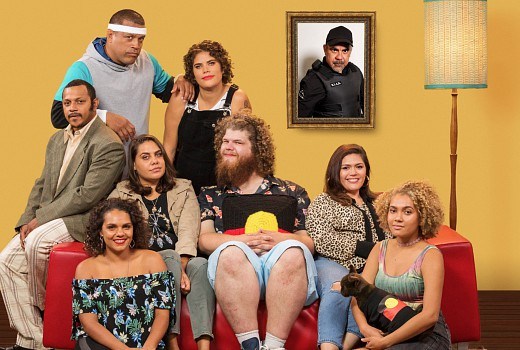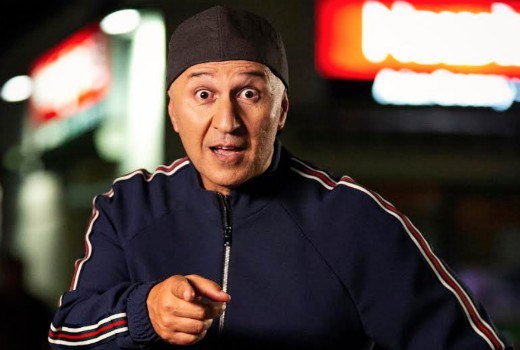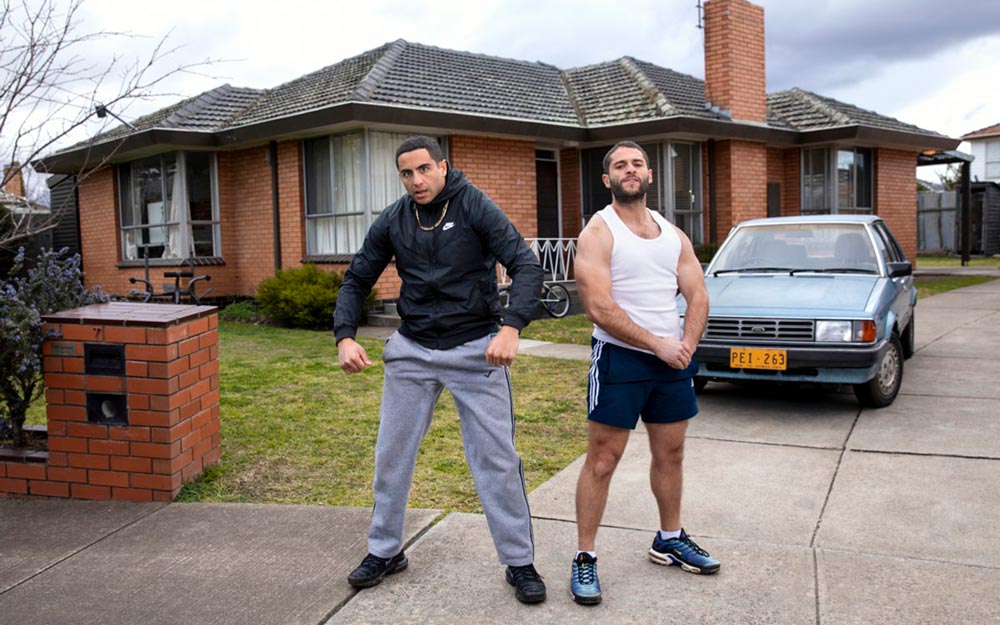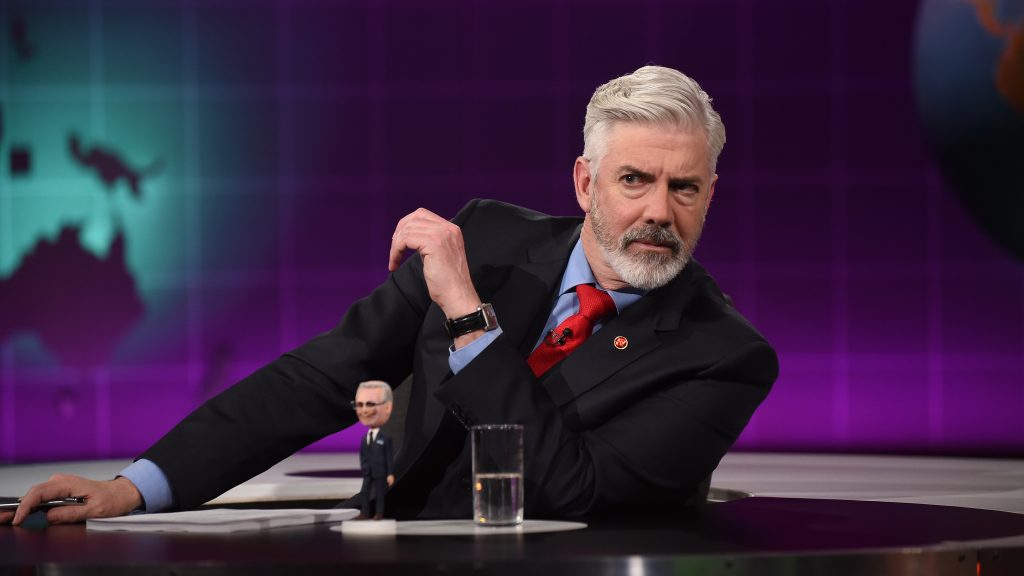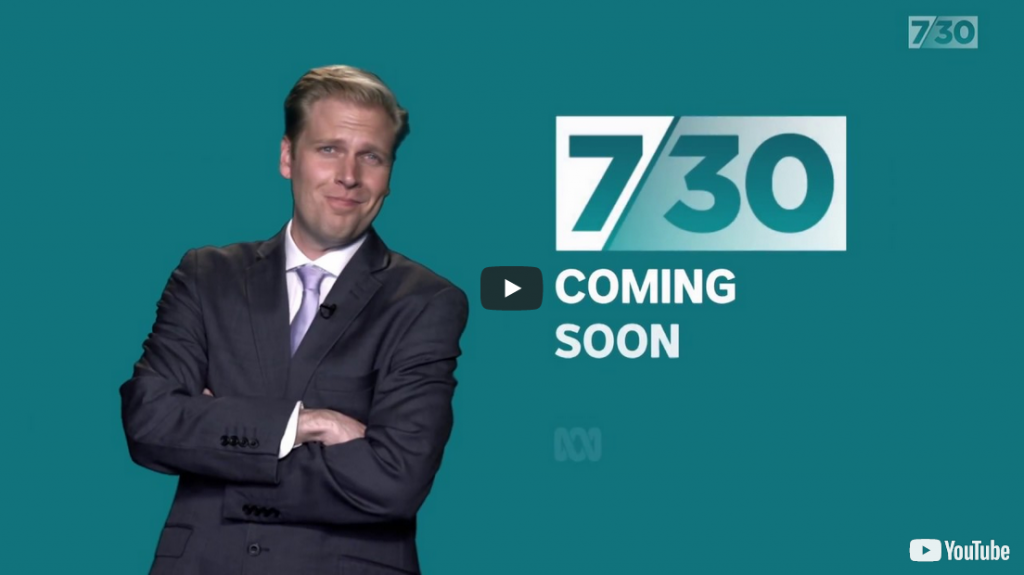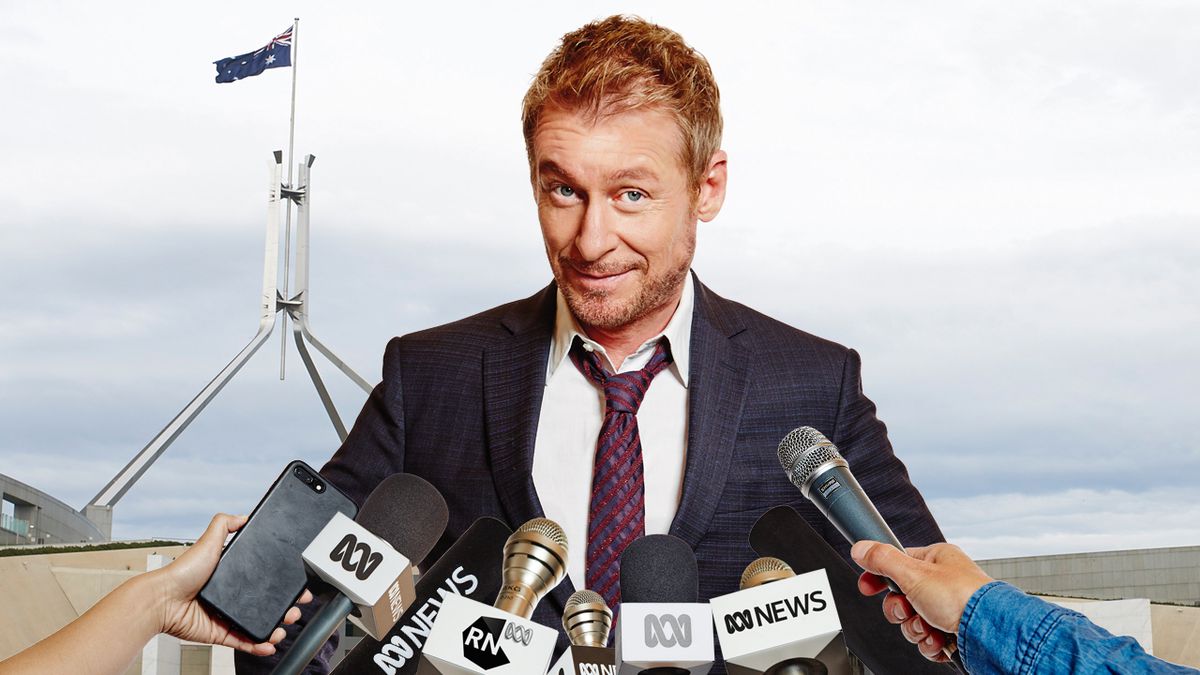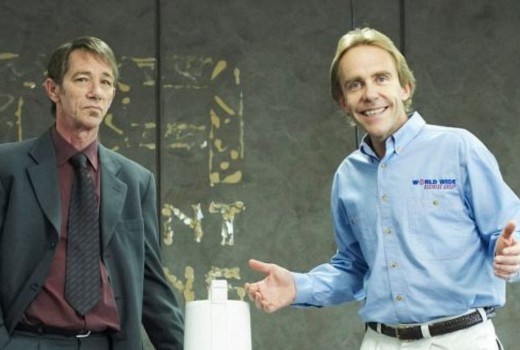Australian Tumbleweeds
The all new Black Comedy
The third series of Black Comedy feels different to previous series. Gone is the popular recurring sketch Tiddas and its catchphrase “What’s this then, slut?”, along with writer/performer Steven Oliver, and filling the gap are some new cast members, a bunch of new recurring sketches and a slightly different feel to the show.
Basically, Black Comedy feels like less of a traditional, big and bold sketch show, with over-the-top characters and stereotypes – although there are still some of those – and more of a serious, politically-minded show with an emphasis on realism. So, while an episode still might open with a boom-tish gag like… “I said a car robbery, not a corroboree!” …later in the show, there’ll be a sketch with rather more bite.
When an indigenous girl brings her white boyfriend home for dinner to meet her parents, he, seemingly, does the right thing by bringing them a gift. “I hope it’s not smallpox” quips the Dad. Actually, it’s worse than that, it’s a Monopoly set. And as the evening progresses, whitey manages to bleed the family dry of all their assets, citing laws of ownership they’re unfamiliar with, and plunging them into debt and poverty. In another similar sketch, a white couple plays Scrabble with an indigenous man, and refuse to accept his indigenous words as he “can’t prove they’re real”. These aren’t exactly hilarious sketches – more horrifying and tragic – but the message is clear.
On a lighter note, there’s this parody of a TV morning show called “Wake Up To Yourself” (the sort of parody TV show title you’d expect of Get Krack!n), where a panel earnestly discuss whether white people are cunts or not. Conclusion: they are.
And fair enough, too.*
Then there’s the more standard sketch show fare, like a parody of The Exorcist with the big reveal that it’s not a possession, just a slovenly cousin who won’t piss off. Or the traditional dance troupe performing for tourists who perform dances about such contemporary rituals as waiting for the dole cheque. Or the uber-PC gay, indigenous housemates, stressing about their cleaner.
There’s some good stuff in this show, from a mix of established and up-and-coming writer/performers. The only problem and we say this about a lot of sketch shows (because it’s true), is that it feels like there’s no shared vision for this show beyond “it’s an all-indigenous cast”. We get that the very fact of an all-indigenous sketch show is pretty visionary (not to mention long overdue), but for this to be a really great show it’s got to be more than that.
* Would it be cunty to point out that this is quite similar to Not The Nine O’Clock News’ Soccer Hooligan sketch, i.e. “Cut off their goolies”, where the basic gag is that the solution to a complex problem is a reductionist, sweary generalisation? Probably.
Vale Australian Stories (Street Smart and True Story)
Australian sitcoms are rarely story-driven. Sure, they have stories, but the laughs usually come from the characters and the dialogue. Kath & Kim was a classic, but what sticks in the mind: the plots, or Kel’s butt-wiggling walk? Whether it’s due to financial limitations or simply playing to their strengths, even the most ambitious Australian sitcoms rarely get much past a group of people in a handful of settings bantering with each other.
So it was something of a surprise to have two comedies based on telling funny stories airing at the same time: Street Smart and True Story with Hamish & Andy. Okay, True Story wasn’t really a surprise – it had been on last year, after all, and this year was basically more of the same only with a slightly less star-studded cast. But whereas last year it seemed like a quirky one-off from the much-loved comedy duo (who’d probably been watching an episode or two of US series Drunk History), having it appear alongside (well, kind of) Street Smart put a new spin on things.
Not that much of anyone saw Street Smart, which was dumped from an early evening Sunday night slot after its first episode. But if you kept the television on after Have You Been Paying Attention? ended each week you would have seen it still plugging away well past its intended audiences of twelve year-olds’ bedtimes doing what it did best… which wasn’t really all that much, because it wasn’t great.
At the other end of the scale, True Story with Hamish & Andy was a class act all the way, even when the episode was about guys dressed as jockeys making a dick of themselves at the Melbourne Cup. Thanks to the hosts skill and charm when it came to teasing the stories out of their civilian guests, plus a halfway decent budget for cast and filming (guess not having official writers pays off… for everyone but the writers), the end result was a comedy highlight.
What they both had in common was the idea of comedy as someone telling you a silly story where things keep on getting out of control. On Street Smart – oh yeah, it was a sitcom about a gang of suburban numbnuts who each week tried (and failed) at a pathetic get-rich-quick crime like stealing money out of shopping trolleys – the stories weren’t “true” (and the characters were cliches, and the dialogue was childish, and you get the idea), but that didn’t stop them being funny: that shopping trolley episode featured a sword fight (involving a toilet brush) between two guys atop a chain of trolleys rolling downhill, which is the kind of comedy visual “quality” most Australian comedy can only dream of.
This idea – that a funny sitcom might want to start with a funny story and go from there – seems obvious until you actually watch Australian comedy. We’re definitely enjoying Back in Very Small Business but it’s a show where the plot is largely there to give the characters a chance to be funny, not something that’s funny in itself. And with most Australian comedy traditionally built around characters or situations, it’s an approach that makes sense.
But occasionally it’s nice to see a comedy that tries something a little different. After all, when someone tells you a funny story there’s usually a decent chance it’ll be funny: when someone is introduced to you as “a bit of a character”, that’s the internationally recognised signal to run.
It’s a Superwog, Wog, Wog, Wog, Wog World
Signing wildly popular YouTube stars Superwog (AKA Theodore and Nathan Saidden) to make a sitcom for ABC Comedy is possibly the smartest move the channel and the ABC have made in years. Last year’s pilot episode has been viewed by almost 4 million people, and episode 1 (released on YouTube last night) has had more than 300,000 views already. It’s probably even more since we wrote that sentence.
Meanwhile, and here’s something you can’t often say about a show that’s less about subtlety and more about shouty, over-the-top ethnic stereotypes, Superwog is funny.
Partly it’s because it taps into something everyone can understand, whether they’re from an ethnic minority or not: the tension between teenagers and their parents. And partly it’s because every type of character in the show, from the permanently-angry Wog Dad to the super nice Anglo-Australian family, are the butt of some decent jokes.
In episode 1, Breaking Dad, Wog Dad (Nathan Saidden) and son Superwog (Theodore Saidden) argue about whether Superwog has to go to school and do swimming, resulting in Wog Dad beating him up. Annoyed about having to swim, Superwog reports his Dad’s behaviour to a teacher at school and is immediately placed in the care of an Anglo-Australian foster family, while Wog Dad and Wog Mum (Theodore Saidden again) go off for psychiatric evaluation.
While Wog Dad proves himself to be the sort of violent psycho who literally bounces off walls with anger (locking him up in a glass-walled room and strapping him to a lie-detector are nice touches), Superwog tries to settle in with his new family, a nice well-off couple, with a nice son, who live in a nice house in a nice suburb. But, inevitably, it doesn’t quite work out for Superwog, and the gradual reveal over the episode that the nice Foster Dad (Andrew Blackman) is every bit as not-quite-right as Wog Dad (in rather different, more creepy ways) is well done.
It’s the kind of subtlety of plot and character you don’t see so much in shows like Here Come the Habibs, Street Smart and Black Comedy, where the focus seems more on the comedy of difference rather than the sameness. It also feels like more time went into producing a good script and getting the performances as funny as possible in this show than in some others in this genre. Either way, it certainly paid off.
You’ve Got To Be In It To Win it
What’s with all the edits? That was our first thought watching Mark Humphries’ first ever comedy segment on 7.30. They were jumping from camera to camera to camera like every comma in his monologue signaled a cut, which was distracting in a way you probably don’t want to be distracted when you’re hoping to get a laugh there somewhere.
This was kind of a weird comedy bit overall really. Obviously there was a point to it: politicians are saps who use sport as a way to connect to regular folk they have nothing in common with. And fake sporting team names and awards are kind of funny.
But the sketch was about people who use sport to connect with their audience, only all the jokes required you to know about sport to get them so… the sketch was actually doing the exact thing it was making fun of? It was a sketch about a smarmy guy trying to win over an audience by being all chummy about sport, only it actually did feature a smarmy guy trying to win over an audience by being all chummy about sport?
We might just go lie down for a minute here.
Okay, we’re back.
Much as we’re almost always scathing about the ABC’s endless attempts to “pick winners” by trying to artificially create popular personalities, this kind of segment really does expose the fact that their underlying logic is sound. By which we mean, John Clarke and Bryan Dawe were amazingly popular and well-loved far, far, beyond the reach of their weekly three minute segment and the ABC would be foolish not to want to replicate that kind of return on investment.
Unfortunately, this isn’t it. John Clarke wasn’t just extremely funny, he was amazingly charismatic and pretty much the most likable man alive, and Bryan Dawe was no slouch either. They had one core brilliant joke that enabled them to do pretty much whatever they liked and still be funny, and if one week it wasn’t exactly thigh-slapping stuff nobody cared because they were fun simply to spend time with. There’s a reason they survived the shift from the high profile 7.30 slot in 2013: their YouTube channel did great numbers, the ABC repeated them a bunch of times in a bunch of places over the week, and when Clarke died everyone was shattered because he was a national institution in two countries.
Mark Humphries, on the other hand… well, he’s no Sammy J, aka the guy who actually did replace Clarke & Dawe in their 6.55pm Thursday timeslot. But with no promotion, no obvious hooks for promotion, and the kind of high concept gags that make it hard to promote Sammy J as “your new satirical fave”, he’s had no impact in 2017 whatsoever.
So here’s Humphries, a man with a satirical brand. Unfortunately he’s “smarmy TV” charismatic, which is his joke in much the same way as Tom Gleeson’s “I’m a prick” is his joke, and in Gleeson’s case that particular joke stopped being a joke a long time ago.
In Humphries case, there’s never going to be a shortage of smarmy pricks to mock so his core strength initially seems like a winner. But it’s hard to avoid the sense that he has to make a joke of how he comes across on screen because how he comes across on screen would otherwise work against his comedy; all his comedy pricks are constantly trying to win people over because his fake attempts at charm are the only things that make him funny.
That’s not really a problem John Clarke ever had.
Pick Up The Pace
So Mad as Hell is good; no news there. But what makes it so good? Being funny doesn’t hurt, but there are a whole lot of pathways to “being funny” and it’s not just the ones that feature Charlie Pickering that lead to dead ends. And while skewering the news doesn’t hurt either, Australia has a long and rich tradition of shithouse satire that set out to skewer the news and ended up giving half the show over to Tom Gleeson insulting people. So what’s the deal?
It’s smart, it’s insightful, it’s silly, it’s packed with pop culture references (and references in general – Dr Caligari, anyone?), Micallef now has a beard, it’s – look, for today at least we’re going to say it’s all down to pace.
We happened to re-watch an early episode of Newstopia recently – ah Inspektor Herring, we hardly knew ye – and boy howdy did it take its time between what were fairly traditional news gags. We dimly remember that, with the early episodes at least, part of the remit was to actually provide some kind of news coverage (as in, you may not have watched these stories on SBS news but maybe a few jokes will get you interested), but by comparison with Mad as Hell it was a show frozen in carbonite.
And you really can’t under-estimate the importance of pace – which is different from mere speed, which would make Family Guy the funniest show ever and not a largely incoherent firehose, but more on that later – in comedy. The faster you go the more jokes you can cram in which increases the chance that one of the jokes is going to work and once someone starts laughing it’s a whole lot easier to keep them laughing. The Willy Wonka sketch on this week’s Mad as Hell was maybe not the most original comedy idea ever (when there’s news about a chocolate factory, where else are you going to turn?), but once the “world of pure automation” line got a laugh at Tumbleweeds HQ the rest of the sketch was a slam dunk.
Which brings up another important factor: performance. Mad as Hell features a range of performers giving a variety of performances, and often the performances themselves aren’t really designed to get laughs on their own – the cast are playing characters that work in context. But when the Wonka sketch came back from the musical number and Francis Greenslade was giving his version of Gene Wilder’s twinkle in the eye, it was comedy gold – and Micallef knew it, struggling to stay silent while returning the stare. This wasn’t the kind of self-indulgent corpsing where the performers laughter is there to sell a weak joke; game recognises game, as nobody we know says.
But performance is part of the pacing. Once you can layer a good performance over a joke you have two things working for you comedy-wise, much like having Micallef say one thing while the caption on screen says another. And Mad as Hell has a lot of things working for it at once, which means that even when a joke might start with an observation that’s not the freshest – as in when Micallef wondered whether we’d get a colour chart if we brought the White Australia policy back, which sounded like it might be going the same place as this famous Family Guy joke:
But then Mad as Hell cut to the interpretive dancers and we’re off in a whole new direction yet again.
Pace also means you can cover more ground, which is… look, it’s no secret that as far as what remains of ABC management is concerned, “balance” in comedy means attacking both sides of politics relatively equally, even though one side has literally zero power over our daily lives. So there’s something of a requirement to put in material that maybe might not be prime comedy gold simply because you can’t just keep on hammering at one side all the time.
Most of the time on Mad as Hell this isn’t a problem, in part because Bill Shorten can’t help dropping the zingers – and we suspect the popularity of that particular swipe has earned Mad as Hell some minor goodwill in the Liberal corridors of power; it’s not like any gag has defined a Liberal leader anywhere near as much. But also because Mad as Hell can bring on characters from various sides of politics and have them make decent points (that line about why aren’t they complaining that a woman was sacked from running the ABC when Mad as Hell is constantly going on about the lack of women in the Liberal side of politics was a deep burn) without them dominating any one episode of the show because again, pace.
Simply put, and if we’d simply put this at the start of this post we could have all gotten on with our lives by now, pace gives you the ability to do more comedy and more with your comedy. Where a slower show is weighed down by the lame jokes required to give balance, a faster show can run through them quickly then get back to the good stuff, or have the room to try a few different angles on material from one side without having the show turn into a partisan rant. And the more things that are going on, the less likely it is that the audience’s attention is going to wander, which is important when a show is dropping in jokes that occasionally require the viewer to be paying attention.
Of course, pace means nothing if all you’re doing is firing shit jokes faster. But if we were going to start praising Mad as Hell‘s writing, we’d be here all week.
You Sack One Managing Director…
Press release time!
Mark Humphries to join 7.30
Begins Thursday October 4th
7.30 are delighted to announce that satirist Mark Humphries will be joining the program with a fortnightly satirical segment starting Thursday October 4.
Mark and his co-writer Evan Williams are excited to join the 7.30 team.
Mark and Evan said: “We had many offers but the prospect of bringing the ABC’s flagship current affairs program down to the level of third-rate undergraduate humour was too tempting to resist.
“We just love the job stability that can only be found at the ABC.”
This is not the first time 7.30 has had satire, with the much loved Clarke and Dawe segments gracing 7.30’s screens for many years.
Mark and Evan said: “We will never be able to fill John Clarke’s shoes, because his family refuses to give them to us.”
Leigh Sales said “I’m a huge fan of quality political satire so you can only imagine my disappointment that we couldn’t land Shaun Micallef.”
The fortnightly segment begins Thursday October 4.
Guess the Pointless gig isn’t quite the dream job it was promoted as.
This is the kind of decision that makes sense on just about every level until you sit down to think about it. Humphries’ satire on The Feed grabbed a lot of attention towards the end, his shift to Ten boosted his profile significantly, and John Clarke remains dead: who better to take his place?
Thing is, Sammy J – remember him? – has been taking Clarke & Dawe’s place Thursdays at 6.55 for most of this year, and Clarke & Dawe’s place was nowhere near 7.30 for the last few years of their run. After a few amazingly bungled attempts to replace C&D – who reportedly were extremely happy to no longer be involved with 7.30 – the ABC current affairs show gave up on comedy entirely and we were all the better for it. So what’s the real deal here?
Our eyebrow remains stubbornly raised at the “fortnightly” schedule too, which may have come from Humphries and Williams (who we guess is either back from his relocation to the US or phoning it in) but seems like the kind of half-arsed compromise that comes from somebody having a great idea that not everybody is convinced by. Having them on once a fortnight is a great way to build up no viewer interest whatsoever (“is this the week the funny people are on?”) – unless the real point is for them to create clips that can “go viral” online and they’re just being dumped on 7.30 to show the ABC is serious about the whole thing.
And then there’s “satirist” Mark Humphries. We’ll get back to you on that.
Raking over the coals
You might say there’s been a bit of a mixed reaction to the new series of Rake. Not all fans of the series have warmed to Cleaver Greene’s move to Canberra, and the show’s writer Peter Duncan appeared to apologise to viewers in an interview with the Daily Telegraph last week. He later clarified what he meant to TV Tonight:
“No apologies”: Rake creator stands firm behind latest season
EXCLUSIVE: Rake co-creator Peter Duncan is standing firm behind the fifth and final season of the ABC drama amid media reports he had apologised to viewers.
Yesterday the Daily Telegraph suggested Duncan had apologised to viewers who had not warmed to Cleaver Greene’s (Richard Roxburgh) shift from Sydney lawyer to Canberra independent senator.
“I can see why people might be disappointed but we’re having fun with it, so I’m sorry,” he told the Daily Telegraph.
But yesterday Duncan clarified to TV Tonight that remark was no more, no less than a ‘throwaway’ line.
“I don’t want anybody to be disappointed… that’s what that remark was about,” he said. “But I’m certainly not apologising for the show, and I have no regrets about any of the decision that we’ve made.”
As fans of the show ourselves, we can understand why audiences may have been a bit reticent about the new series. The opening double episode (about the visit to Canberra of US Defence Secretary Linus Potemkin) was a bit…messy? But since then, it’s been very much business as usual: Cleaver gets himself into a complicated situation, potentially facing bankruptcy or jail, and then gets himself out of it via clever, if slightly dodgy, means.
So, what’s not to like? Maybe it’s the fact that we’ll clearly be seeing more of Defence Secretary Potemkin (Anthony La Paglia) in the series but, so far, he’s been a weird character at the centre of weird storyline.
We can buy that a US politician was mates with Cleaver 20 years ago and that any mate of Cleaver’s would prefer to skip out on his bodyguards and the political summit he’s attending and go party, but the bit where Potemkin spent a few nights living in a cheap motel seemed more like the move a character in a serious drama would make. A serious drama about a guy having a breakdown, we mean, not Rake, which has always skewed more towards satire and comedy than serious storylines about realistically-drawn characters in crisis.
That, and the gag about how Potemkin’s bodyguards have “female” names (such as Beverly), didn’t quite sit right. It felt like a gag from a previous era that had been shoehorned-in to the script to lighten things up. Either way it didn’t work, although the return of Potemkin could still be interesting; there are hints that the government he’s part of is quite warmongering, and it’s easy to imagine he and Cleaver mixed-up in a sort of Doctor Strangelove-type scenario, with Cleaver Green having to save the world for US aggression. Or something like.
But where Rake’s really been firing this series is its parodies of independent senators, notably Jane Turner as Penny Evans, a sort of Julie Bishop meets Michaelia Cash meets Pauline Hanson figure, who quickly became a foil for Cleaver. Add to the mix fellow new politicians David Potter (Matt Day) and Cal McGregor (Damien Garvey), and the move to Canberra by Cleaver’s long-time assistant Nicole (Kate Box), his former mistress Missy (Adrienne Pickering) and his ex-wife Wendy (Caroline Brazier), and it really, really is Rake business as usual. Business that could easily carry on for a few more series.
We’re going to keep watching, anyway. If only to find out what the deal is with the Polish Comcar driver and his shady mates.
Back in Very Small Business should get back to Very Small Business
Three episodes in and we’re increasingly unsure about Back in Very Small Business, the reimagining of the brilliant 2008 sitcom Very Small Business.
The original, largely a two-hander between Don Angel (Wayne Hope) and Ray Leonard Leonard (Kim Gyngell), was an “odd couple” comedy, in which insensitive, boorish, “Howard battler” Angel owned and operated a number of dodgy small businesses from a suburban business park, with the assistance of Leonard.
A former political journalist for The Australian, Leonard takes a job with Don because he needs the money after six years on sick leave following a breakdown. Within minutes, he finds himself writing advertorial copy for Don’s stable of niche publications – Railway Union Monthly, Footy Inquest, Lower Croydon News, Feelin’ Great and Music Music Music Music (it was supposed to be Music Music Music but the printer added one too many musics) – and despite being better than this as a writer, he throws himself into churning out 250-word “stories” about brass instruments, vanity units and adult products. Leonard reading out these flowery and often over-intellectual pieces, deadpan, was often the highlight of each episode.
If only there were scenes as funny as those in Back in Very Small Business because somehow it feels a less hilarious show. Partly it’s the introduction of a large cast of regular characters, who haven’t yet established their comic persona, and partly it’s because Angel’s World Wide Business Group seems reasonably successful in 2018, at least compared to 2008 when Angel personally worked the phones for all his magazines, as well as operating some vending machines and a chicken and chip shop.
In Very Small Business, the laughs often came from Don’s desperation to make a sale by any means (often very bullshit means), whereas in Back in Very Small Business Don seems to have (mostly) worked it out. His copycat furniture and novelty products sell well, people are buying franchises of Don’s Dirty Dog Wash (a business he was inspired to start in Very Small Business), his team have developed a hit new fashion belt and his daughter Sam (Molly Daniels) has just signed-up a high-profile Instagram celebrity to their online influencer company.
There have been some problems, children have been eating Don’s novelty pineapple-scented rubbers (prompting an ACCC investigation and legal action from the parents) and a footballer pulled out of an Instagram deal, but mostly it’s smooth sailing for the WWBG in 2018. Instead of the hatchback and rented flat of ten years ago, Don’s got a McMansion, he’s riding around in a top-of-the-range four-wheel drive, buying expensive (if awful) leather jackets and has a hot girlfriend. No wonder he’s not so funny anymore. Successful people aren’t funny…unless they stuff up in a funny way, which hopefully Don will do really soon.
At the risk of sounding dramatic, Back in Very Small Business is more a wacky dramedy than the laugh-packed sitcom it was a decade ago. And as an audience, we’re being asked to root for the characters rather than laugh at their stupidity. It’s perhaps more the kind of show that TV executives and mainstream audiences want, but it’s not what lovers of comedy want. We want scenes like the one in Very Small Business were Don gets off the phone, having sold a small ad in Footy Inquest, and says to Ray “God, I love small business, that is better than a root, better than the last one I had, anyway” with a look on his face like he’s achieved some kind of nirvana.
Sure, that sort of self-aggrandisement and business cliché-spouting is still a part of the show, but it seems to work less well, and be less the point of the show. Back in Very Small Business is more about plot than dialogue and character these days. So, if you’re looking for laughs, go find a copy of Very Small Business on DVD or watch this playlist on YouTube for some highlights from the series.
Vale The Weekly 2018
The funniest thing about The Weekly this year was the way that during the coup that deposed Malcolm Turnbull pretty much everyone said “gee, wouldn’t it be great if Mad as Hell was on now to make fun of all this?” Because what was The Weekly‘s big satirical contribution to that whole debacle? Oh, that’s right – a segment where Tom Gleeson challenged Charlie Pickering for the leadership of The Weekly. No wonder Kitty Flanagan quit.
Speaking of The Weekly losing the only cast member still actually contributing anything funny to this particular sack of crap, it’s a sign of just how little much of the Australian media thinks of The Weekly that many of the reports covering her departure assumed she just showed up on the day and said “fuck all y’all, I’m out”.
Said Junkee:
Last night’s episode of The Weekly was the last one for the year, and also the last one with Flanagan on staff. The comedian broke the news of her resignation on-air, telling host Charlie Pickering that she’s had enough.
TV Tonight was a little better:
She announced the news last night on the show with a comedic “In Memoriam” song parody.
And TV Week also went with “announced”, which was probably more accurate than “co-host”
During the season finale of The Weekly With Charlie Pickering, comedian and co-host of the show Kitty Flanagan announced she was leaving after four seasons.
And hey, maybe she did just announce it to the cast and crew on the night. It’s not like Briggs ever came out publicly and said “don’t be fooled by the opening credits, I’m barely on this show”.
Obviously losing Flanagan is a big blow to The Weekly, in that she was pretty much the only thing preventing it from being Charlie and Tom’s Smug Bunker. But there has to come a time in every Weekly cast member’s life when they look around and realise that if the ABC hasn’t given them their own spin-off by now, it’s never going to happen.
(hey everybody, Hard Quiz is back this week! It’s almost as if the ABC is scared that if they go a week without Tom Gleeson everyone will realise just how utterly pointless he is)
So Flanagan is gone, Briggs is a special guest interviewer, and the show is basically now three segments from Pickering and two from Gleeson – Hard Chat now being so rusted on that Gleeson often gets an extra spot for his fake tourism shit or whatever – so it’ll be interesting to see if they even bother replacing either with anyone full-time. Has there ever been a long-running show anywhere that’s worked so hard to remove all the elements that were fresh and original while steadfastly maintaining the tired old shit?
So it’s time for some Hard Facts: after four years and 7000 episodes, it’s painfully clear to pretty much everyone outside of ABC management that The Weekly is a failure. Sure, it rates well; that’s because it’s given a prime time slot on the ABC’s best night and the hosts are promoted ceaselessly by the ABC publicity department. In contrast, is Sammy J’s Playground Politics even still on? Where did Lawrence Mooney go?
Yes, we hang shit on Tom Gleeson a lot. But is there any other ABC “personality” who has one show finish then another start the next week? And this year the ABC went from Hard Quiz to The Weekly and now back to Hard Quiz – Gleeson has been on the ABC every week this year since February 21st. Remember, this isn’t someone likable, let alone popular; it’s Tom Gleeson, comedy smug fuck.
As for Pickering, he’s already got his own showcase spin-off lined up, plus he’s still coasting on his Project fame so he’ll be an audience draw for a while yet. But The Weekly itself? it’s a flop. It generates no stories, it’s segments aren’t shared around, its cast – now that Flanagan has left – aren’t particularly funny and when the big stories break everyone wishes Mad as Hell was the one covering them.
Decent news satire – even in this country – is about adding to the news. You take a story and add a funny spin to it, even one as basic as having a parody of one of the main players saying out loud what’s really going on. Mark Humphries figured it out at The Feed and people were sad when he quit; the crew at Tonightly figured it out and people were sad whey they got axed. When The Weekly covers a big news story, all they add are a few smug “can you believe this shit?” jokes. Their one big comedy angle is Tom Gleeson treating people like garbage.
Increasingly The Weekly feels like the kind of show that keeps going solely because powerful people have invested heavily in it and they need it to be a success. The moment they move on – or someone does the math and realises for what they’re spending on Pickering and Gleeson they could get three or four decent presenters – the plug will be pulled.
Now Kitty Flanagan is gone, hardly anyone will care.
Nostalgia’s a Hell of a Drug
Press release time!
Tick F***ing Tock… the Doug Anthony Allstars are back on the ABC
The two-part factual series Tick F***ing Tock screens from Tuesday 2 October at 9.30pm on ABC & ABC iview.
The Doug Anthony Allstars were comedy superstars, until Tim Ferguson unexpectedly pulled the plug, breaking the hearts of Paul McDermott and Richard Fidler. Years later they discovered Tim had Multiple Sclerosis (MS) and put aside their differences to reunite and live the glory days again.
This two-part documentary series, Tick F***ing Tock, screening from Tuesday 2 October at 9.30pm on ABC & ABC iview, chronicles the story of the bad boys of Australian comedy – and for the first time they confront how Tim’s MS impacted on their friendships at each step to international stardom. This is also an enduring love story between Tim and Paul, two of our greatest creative minds with the same confrontational attitude they’ve always had. All the while knowing that time is not on their side – Tick F***ing Tock…
“You can’t help seeing what’s going on between these two guys and how long they’ve been together and what they’ve been through and they’re still going through. It’s a really, really moving thing for the audience, you know I’ve got to admit it, it occasionally gets to me as well…” Paul Livingston.
Curated by comedy curmudgeon Ted Robinson, who gave the Allstars their first Australian break on the TV program The Big Gig, for the first time Tim, Paul and Richard discuss why the group broke up and the sadness of watching Tim deal with his debilitating illness – and in Allstars’ style, they can’t help being candid, moving, irreverent and funny.
From the ages of 19 to 32, Tim experienced random symptoms – crossed eyes, tingling, numbness – that were finally diagnosed as MS a year after the Allstars broke up. Throughout the film Tim talks about how it took him a long time to connect the dots about his illness.
The series features the Allstars’ outrageous acts from The Big Gig and DAAS Kapital and their best songs, ranging from the controversial – Funk You and World’s Greatest Kisser – to their classic covers – Throw Your Arms Around Me and I Heard It Through the Grapevine.
Episode one focuses on the group’s first 10 years. From buskers on the streets of Canberra in the mid-1980s, they quickly became huge stars in the UK. But in 1994 Tim called it quits and the Allstars broke up. Paul and Richard were devastated, with the group on the verge of true international success. It was another 12 years until Tim finally confessed to them that he had MS.
In episode two the Allstars reform 30 years later as the “cripple” (Tim Ferguson, now in a wheelchair), the “superstar” (Paul McDermott) and the “pensioner” (Paul Livingston). And once again, even after the confronting reality of Tim’s illness on and offstage, they quickly find success.
They make a triumphant return to the Edinburgh comedy festival, with their shows described as more brilliant than ever. Audiences are moved by Paul McDermott finding the lighter side of Tim’s MS and their audacious humour and angelic songs.
Paul Livingston observes how the show is about “falling apart, about being old, about not being able to cope any more. It works really well because we are not really acting. None of us.”
While Tim assures the audience he will probably die before them … Tick F***ing Tock…
What’s that you say? A story about an inspirational struggle with illness on the ABC? Guess it must be a Monday.
Shows what we know: it’s on a Tuesday, and this actually could be good. Everyone involved is alive and willing to talk, there’s plenty of clips to be shown (DAAS are one of the very few early 90s-era ABC comedy acts to have had a full DVD release) and the nature of their comeback makes it likely that they’ll have some decent material based around the struggles this documentary is obviously going to be focusing on. So fingers crossed it won’t be too maudlin.*
And let’s not forget, “This is also an enduring love story between Tim and Paul”, so presumably they’ll be heaping shit on former sidekick turned ABC bigwig Fidler. Here’s hoping for some Don’t Forget Your Toothbrush clips thrown in.
* It really shouldn’t be, as the recent tour the trio did was a solid night’s entertainment, packed with self-deprecating material about Tim’s illness, which their fans lapped-up.

